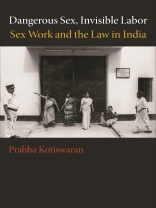Popular representations of third-world sex workers as sex slaves and vectors of HIV have spawned abolitionist legal reforms that are harmful and ineffective, and public health initiatives that provide only marginal protection of sex workers’ rights. In this book, Prabha Kotiswaran asks how we might understand sex workers’ demands that they be treated as workers. She contemplates questions of redistribution through law within the sex industry by examining the political economies and legal ethnographies of two archetypical urban sex markets in India.
Kotiswaran conducted in-depth fieldwork among sex workers in Sonagachi, Kolkata’s largest red-light area, and Tirupati, a temple town in southern India. Providing new insights into the lives of these women–many of whom are demanding the respect and legal protection that other workers get–Kotiswaran builds a persuasive theoretical case for recognizing these women’s sexual labor. Moving beyond standard feminist discourse on prostitution, she draws on a critical genealogy of materialist feminism for its sophisticated vocabulary of female reproductive and sexual labor, and uses a legal realist approach to show why criminalization cannot succeed amid the informal social networks and economic structures of sex markets. Based on this, Kotiswaran assesses the law’s redistributive potential by analyzing the possible economic consequences of partial decriminalization, complete decriminalization, and legalization. She concludes with a theory of sex work from a postcolonial materialist feminist perspective.
Om författaren
Prabha Kotiswaran is lecturer in law at the School of Oriental and African Studies at the University of London.












